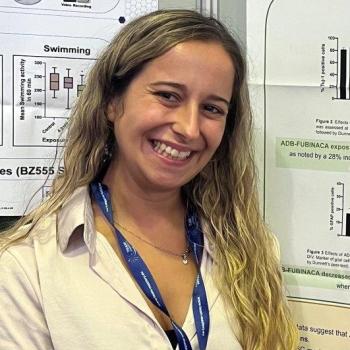The synthetic cannabinoids ADB-FUBINACA and AMB-FUBINACA inhibit the autophagic activity of human Svg-p12 astrocytes
Astrocytes are involved in various complex functions within the brain, including the modulation of neuronal function. Synthetic cannabinoids (SCs) may influence astrocyte function, potentially leading to alterations in neuroinflammation, oxidative stress and other processes. However, there is a notable scarcity of information regarding the toxicological effects of SCs on astrocytes. Given the existing evidence suggesting that phytocannabinoids can induce autophagy in astrocytes, we herein aimed to evaluate the toxicity of two SCs commonly identified in drug seizures, in particular their ability to modulate autophagic activity in human astrocytes.
Human SVG p12 astrocytes were exposed for 24h to ADB-FUBINACA (ADB) or AMB-FUBINACA (AMB) at 1pM, 1nM, 1µM, and 10µM. A solvent control (0.02% DMSO) and positive controls were also tested. Assayed toxicological endpoints included metabolic activity (MTT reduction), lysosome integrity (neutral red inclusion), plasma membrane integrity [lactate dehydrogenase (LDH) release], cytosolic calcium levels, intracellular ATP and mitochondrial membrane potential (MMP; analyzed by TMRE labelling). Autophagic activity was measured using the CYTO-ID assay kit in cells exposed to both SCs for 24h at 1nM and 1µM. Rapamycin (1µM) was used as an autophagy positive control.
None of the SCs tested significantly affected metabolic activity, lysosomal or plasma membrane integrity, mitochondrial activity, cytosolic calcium, and intracellular ATP levels up to 10 µM, as compared to the solvent control. Interestingly, AMB inhibited autophagic activity by about 30% at 1 nM (p<0.05) and 1 µM (p<0.01) relative to the control. A similar reduction (about 30%), relative to the control was also observed for 1 µM ADB (p<0.01).
ADB and AMB showed no cytotoxicity in human astrocytes up to a concentration 10-fold higher than those considered biologically relevant (< 1µM). However, the AMB- and ADB-induced inhibition of autophagy in astrocytes can potentially disrupt normal cellular maintenance by preventing the elimination of malfunctioning astrocytes, and thus contribute to the neurotoxic effects of SCs, similar to what can be observed in several pathological conditions, such as Alzheimer´s disease. Further research is thus needed to evaluate the signaling pathways that may be involved in these observed effects on autophagy.
This work was partly funded by FEDER and by national funds from Fundação para a Ciência e a Tecnologia (FCT) in the scope of the project NeuroSCANN (POCI-01-0145-FEDER-029584) and the grants UIDB/04378/2020 (UCIBIO) and LA/P/0140/2020 (i4HB). RS and JPS also acknowledge FCT for PhD grant 2020.07154.BD and research contract (under Scientific Employment Stimulus) 2021.01789.CEECIND/CP1662/CT0014, respectively.
